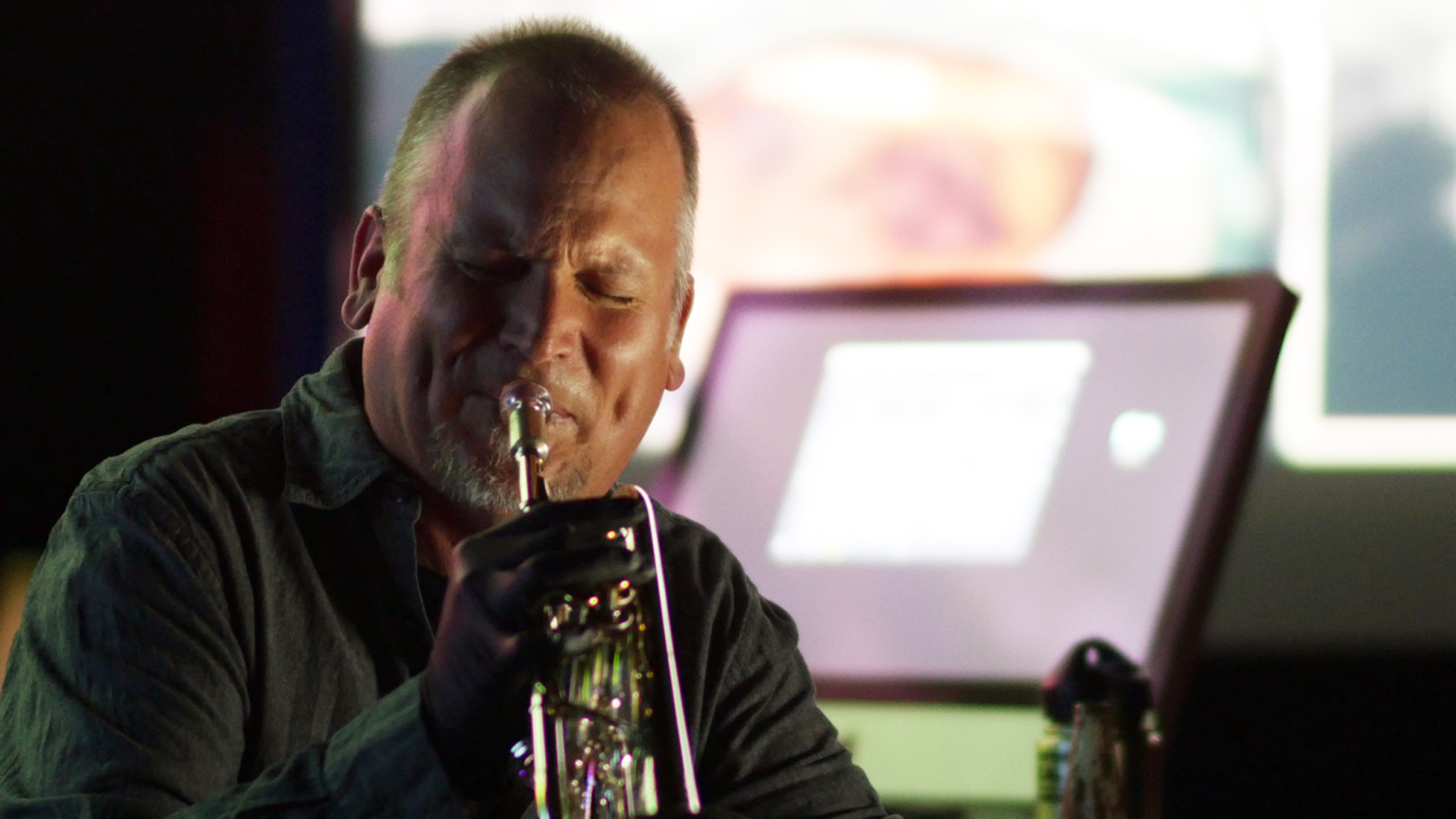
CONDUCTION is a vocabulary of signs and gestures transmitted by a conductor to an orchestra, providing instantaneous possibilities for altering or initiating : harmony, melody, rhythm, articulation, phrasing or form. Conduction was originated by Lawrence D. “Butch” Morris : (2/10/47 – 1/29/13).
On September 11th at 8pm at Roulette, guitarist Brandon Ross will perform as part of an ensemble with J.A. Deane leading Conductions also including Graham Haynes, Steven Bernstein, Taylor Ho Bynum, Stephanie Richards, Doug Wieselman, Miguel Frasconi, Tim Motzer and Kenny Wolleson.

You played in Conduction #1, Butch’s first performance of his newly developed Conduction language. Can you tell me about that experience?
It was an adventure. I didn’t know what Butch had invited me to do. He just asked me to come and play that night. Acoustic guitar – He did specify that, and he knew I loved playing acoustic guitar. I remember him gathering the ensemble back stage and explaining a basic gestural language he planned to use to direct (the flow of) the improvisation. I knew only a few of the people in that band he assembled, like frank Lowe, and maybe Eli Fountain was there I think. But I didn’t know John Zorn, though we’d met in passing, or Zeena Parkins/Tom Cora/Christian Marclay… It was exciting and fun, and intense.
Was that your first musical experience with Butch?
I think it was a night at (the former) Sweet Basil (jazz club), and Butch came up and introduced himself and asked me if I wanted to do some playing in a small ensemble he was experimenting with. I was playing the club with Leroy Jenkin’s band “STING!” at the time. It must have been in 1983. We played at an E.6th street spot called Shuttle Theatre – in the basement. Wayne Horvitz was playing keyboards, Greg Tate was also playing some guitar occasionally, maybe Zeena – I just remember that we each earned like $6.00 for the whole performance! It was funny, because during what became Butch’s last year of local activity, with the “Lucky Cheng Orchestra”, 30 years later, ironically, the pay scale was still the same! – even though the concept of Conduction and the level of authority and fluency in the form was at an extremely high degree of realization.
To put that performance into perspective–what was happening in the jazz and improvised music scene at that time?
At that time there was about to be an “ideological” split in the Jazz world – not necessarily among the musicians, but a kind of inevitable, pendular swing, toward a more conservative pedagogical approach. A reaction to the innovative thrust of the previous generation of younger musicians of the 60’s and 70’s. The improvised music scene, and the Jazz scene were about to be culturally, socially, economically and ideologically divided… again. Butch never participated in that trend of “musical apartheid”. His ensembles ALWAYS introduced musicians of different scenes, to one another, because Butch put people and energies/expressions into a holistic musical vision.
You stayed a close and loyal friend and collaborator with Butch for so many of his conductions throughout many years. What kept you coming back ?
Conduction is a Master form of formlessness. Being conducted which is an encounter unique to most musicians musical experiences, no matter what background they develop out of. It asks a musician to create in the moment, invent, and yet allow that invention to be “tailored” simultaneously, by another, “over-seeing mind” – not in the sense of domination, but in the sense of allowing external direction. The physical demands of being conducted also evoked an extended type of technique, rare in any ensemble playing I have ever been a part of outside of Conduction. The thrill and excitement of not-knowing where the music would go, how it would sound, when it would climax, resolve, conclude, was exhilarating.
Did you remark an evolution in his language?
That language expanded each time I engaged with Butch, both in performance and in conversation. The gestural lexicon was clearly a function of Butch’s personal creative goals, and as he worked with more musicians, in more places, I believe his need to find ways to evoke the elements and qualities of sound and interaction, kept the language moving forward. Technology introduced a particular set of signs that would not have come about if those tools/developments did not exist. Music sampling and looping technologies generated a set of signs that were a direct result of his desire to include those sounds into his creative expression/vision.
Can you define conduction in your words–what does conduction mean to you?
I had once, (very publicly as it turned out) defined Conduction as “Butch’s Problem”. It was and remains a particularly worthy creative endeavor. A kinetic form, limited only by the imagination of the participants, on both sides of the relationship of Conductor/Conductees. I think Conduction is a modern American Orchestra form. An ingenious technique that is both rigorous and playful, and which interrupts the musical assumptions of player and listener alike, and asserts the potent vitality of improvisation as a living artform
Is it jazz?
It could ONLY be “Jazz”… in America. In other places, and in other hands and minds and hearts, it becomes THAT. It is mutable, and flexible and at it’s finest is continually fresh! In Butch’s hands it was always about advancing the music. He often said, “Advance, advance, advance…” when asked what he was trying to do.
Lastly, how has your friendship with Butch moved you and contributed to the musician that you are today?
My friendship with Butch was very illumined. Butch was an older brother to me – and we always encouraged each other. When someone “taps” you to come an play with them, it’s a sign that they see something in you that they admire and that they can use. Butch tapped me when I first got into the scene in NYC. He was a real hipster – and I mean that in the classic sense – quite different from the contemporary connotation and usage. Butch shared his creative energy with his colleagues/friends. I find that the courage to move into your vision and pursue it, fully, is a quality that Butch demonstrated for not only me, but all of those of us who knew him socially and personally. As a creative improvising musician, there is perhaps no greater learning than that to realize within one’s Self.
Where do you see improvised music and jazz moving forward from here?
I see those areas of music making becoming populated with a glut of institutionally-trained, culturally dis-associated, un-imaginative, “technically” proficient individuals, bogged down in veneration of the assumptions/insights of other people. Which is to say, they don’t appear to have a purpose or sense of direction, that is alive inside of them. Therefore the meaning is absent. The forms outweigh the communication.
Going forward or to quote Butch, to “advance”, I see a need to go within, and again, to quote Butch from the documentary “Black February”, to have a question, as a student of music. “If you’re a student of music, and you don’t have a question, you’re in trouble.”
There is so much opportunity to expand and to create a music world rich in diversity and quality. There is little reason for any musician to sound so much like another musician such that there’s a redundancy. There will be commonality, naturally, but the questions each of us asks and pursues the answer/s to, will take us to a bountiful Unknown. If that spirit of adventure, bravado, blatant disregard, insight, rarity and courage prevails, the future will blaze like a million suns. the sound of which would be___________!!!
Interview by Stephanie Richards

